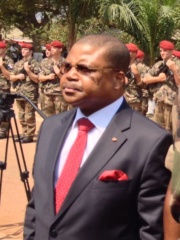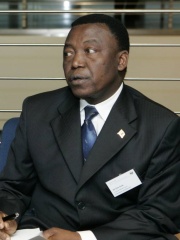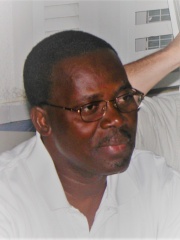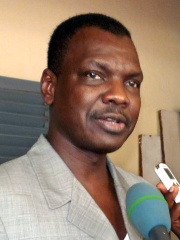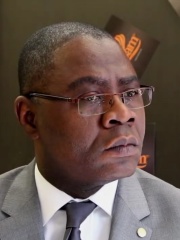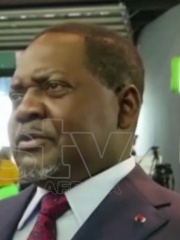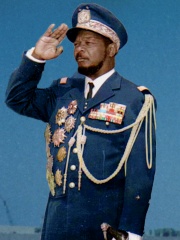
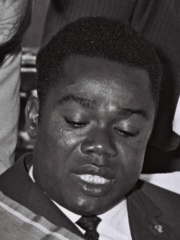
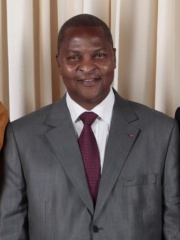
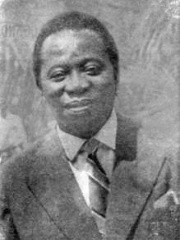
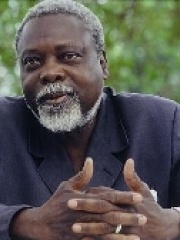
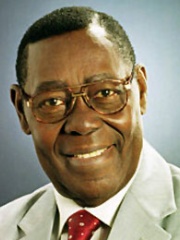
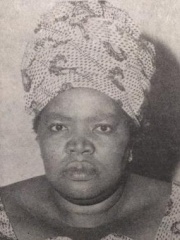
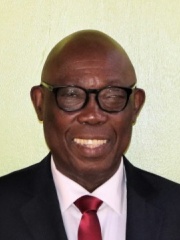
The Most Famous
POLITICIANS from Central African Republic
This page contains a list of the greatest Central African Politicians. The pantheon dataset contains 19,576 Politicians, 16 of which were born in Central African Republic. This makes Central African Republic the birth place of the 122nd most number of Politicians behind Turkmenistan, and Dominican Republic.
Top 10
The following people are considered by Pantheon to be the top 10 most legendary Central African Politicians of all time. This list of famous Central African Politicians is sorted by HPI (Historical Popularity Index), a metric that aggregates information on a biography's online popularity. Visit the rankings page to view the entire list of Central African Politicians.

1. Jean-Bédel Bokassa (1921 - 1996)
With an HPI of 79.40, Jean-Bédel Bokassa is the most famous Central African Politician. His biography has been translated into 72 different languages on wikipedia.
Jean-Bédel Bokassa ([ʒɑ̃ bedɛl bɔkasa] ; 22 February 1921 – 3 November 1996) was a Central African politician and military officer who served as the second president of the Central African Republic (CAR), after seizing power in the Saint-Sylvestre coup d'état on 1 January 1966. He later established the Central African Empire (CAE) with himself as emperor, reigning as Bokassa I until his overthrow in a 1979 coup. Of this period, Bokassa served about eleven years as president and three years as self-proclaimed Emperor of Central Africa, and although the regime gave the appearance of being a constitutional monarchy, in practice it was an autocratic regime. His imperial regime lasted from 4 December 1976 to 21 September 1979. Following his overthrow, the CAR was restored under his predecessor, David Dacko. Bokassa's self-proclaimed imperial title did not achieve international diplomatic recognition. In his trial in absentia, Bokassa was tried and sentenced to death. He returned to the CAR in 1986 and was put on trial for treason and murder. In 1987, the jury did not decide on the charges of cannibalism because of a general amnesty, but found him guilty of the murder of schoolchildren and other crimes. The resulting death sentence was later commuted to life in solitary confinement, but he was freed in 1993. Bokassa then lived a private life in Bangui, and died in November 1996. Bokassa was posthumously rehabilitated by President François Bozizé in 2010, leading to an upsurge in his popularity, despite his well-known crimes and extravagances.

2. David Dacko (1930 - 2003)
With an HPI of 67.73, David Dacko is the 2nd most famous Central African Politician. His biography has been translated into 40 different languages.
David Dacko (French pronunciation: [david dako]; 24 March 1930 – 20 November 2003) was a Central African politician who served as the first President of the Central African Republic from 14 August 1960 to 1 January 1966 and as the third President of the Central African Republic from 21 September 1979 to 1 September 1981. He also served as Prime Minister of the Central African Republic from 1 May 1959 to 14 August 1960. After his second removal from power in a coup d'état led by General André Kolingba, he pursued an active career as an opposition politician and presidential candidate with many loyal supporters; Dacko was an important political figure in the country for over 50 years.

3. Faustin-Archange Touadéra (b. 1957)
With an HPI of 66.54, Faustin-Archange Touadéra is the 3rd most famous Central African Politician. His biography has been translated into 58 different languages.
Faustin-Archange Touadéra (French: [fostɛ̃ aʁkɑ̃ʒ twadeʁa]; born 21 April 1957) is a Central African politician and mathematician who has been President of the Central African Republic since March 2016. He previously was Prime Minister of the Central African Republic from January 2008 to January 2013. In the December 2015 – February 2016 presidential election, he was elected to the presidency in a second round of voting against former prime minister Anicet Georges Dologuélé. He was re-elected for a second term on 27 December 2020.

4. Barthélemy Boganda (1910 - 1959)
With an HPI of 65.03, Barthélemy Boganda is the 4th most famous Central African Politician. His biography has been translated into 35 different languages.
Barthélemy Boganda (c. 1910 – 29 March 1959) was a Central African politician and independence activist. Boganda was active prior to his country's independence, during the period when the area, part of French Equatorial Africa, was administered by France under the name of Oubangui-Chari. He served as the first Premier of the Central African Republic as an autonomous territory. Boganda was born into a family of farmers, and was adopted and educated by Roman Catholic missionaries after the death of his parents. In 1938, he was ordained as a Roman Catholic priest. During World War II, Boganda served in a number of missions and afterwards was persuaded by the Bishop of Bangui to enter politics. In 1946, he became the first Oubanguian elected to the National Assembly of France, where he spoke out against racism and the abuses of the colonial regime. He then returned to Oubangui-Chari to form a political organisation, culminating in the 1949 foundation of the Movement for the Social Evolution of Black Africa (MESAN), which became popular among villagers and the peasantry. Boganda was laicized from the priesthood after developing a relationship with and eventually marrying Michelle Jourdain, a parliamentary secretary. Nonetheless, he continued to advocate for equal treatment and fundamental rights for blacks in the territory well into the 1950s. As France conceded measures of representation to its colonies, MESAN won local elections and he gained influence in Oubangui-Chari's government, though his reputation suffered when he backed an unsuccessful economic scheme. In 1958 French Prime Minister Charles de Gaulle proposed the creation of a French Community through which France's colonies could associate with the metropole. After being assured that Oubangui-Chari's membership in the community would not preclude it from securing independence at a later time, Boganda supported joining it. He sought to do so as part of a federation with other territories in French Equatorial Africa as a "Central African Republic", which he believed would bolster the financial situation of the member states. He hoped this would serve as the basis for a United States of Latin Africa, a conglomeration including other countries in central Africa. This never came to fruition, and on 1 December, Boganda declared the establishment of the Central African Republic for only Oubangui-Chari. Boganda became the autonomous territory's first premier as the President of the Council of Government, and began drawing up administrative reforms and preparing for the next election. He was killed in a plane crash on 29 March 1959, while en route to Bangui. Experts found a trace of explosives in the plane's wreckage, but a full report on the incident was never published, and the possibility of an assassination remains unresolved. The Central African Republic attained formal independence from France in 1960. Boganda's death is annually commemorated in the country, and his presence in the national collective memory remains politically potent.
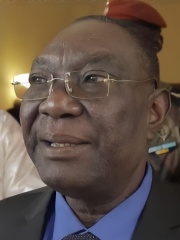
5. Michel Djotodia (b. 1949)
With an HPI of 64.92, Michel Djotodia is the 5th most famous Central African Politician. His biography has been translated into 31 different languages.
Michel Am-Nondokro Djotodia (born c. 1949) is a Central African politician who was President of the Central African Republic from 2013 to 2014. He was the first Muslim to hold that office in the predominantly Christian country. Djotodia was a leader of the almost entirely Muslim Séléka rebel coalition in the December 2012 rebellion against President François Bozizé. Following a peace agreement, Djotodia was appointed to the government as First Deputy Prime Minister for National Defense in February 2013. When the peace agreement unravelled, Séléka captured Bangui and Djotodia took power on 24 March 2013. He promised to lead a transition to new elections in which he would not be a candidate, but his time in office was marked by escalating sectarian violence, and he was ultimately pressured into resigning by regional leaders on 10 January 2014.

6. Ange-Félix Patassé (1937 - 2011)
With an HPI of 64.48, Ange-Félix Patassé is the 6th most famous Central African Politician. His biography has been translated into 35 different languages.
Ange-Félix Patassé (25 January 1937 – 5 April 2011) was a Central African politician who was president of the Central African Republic from 1993 until 2003, when he was deposed by the rebel leader François Bozizé in the 2003 coup d'état. Patassé was the first president in the CAR's history (since 1960) to be chosen in what was generally regarded as a fairly democratic election (1993) in that it was brought about by donor pressure on President André Kolingba and assisted by the United Nations Electoral Assistance Unit. He was chosen a second time in a fair election (1999) as well. However, during his first term in office (1993–1999), three military mutinies in 1996–1997 led to increasing conflict between so-called "northerners" (like Patassé) and "southerners" (like his predecessor President André Kolingba). Expatriate mediators and peacekeeping troops were brought in to negotiate peace accords between Patassé and the mutineers and to maintain law and order. During his second term as president, Patassé increasingly lost the support of a number of his long-time allies as well as the French, who had intervened to support him during his first term in office. Patassé was ousted in March 2003 and went into exile in Togo.

7. André Kolingba (1936 - 2010)
With an HPI of 63.15, André Kolingba is the 7th most famous Central African Politician. His biography has been translated into 31 different languages.
André-Dieudonné Kolingba (12 August 1936 – 7 February 2010) was a Central African politician, who was the fourth President of the Central African Republic (CAR), from 1 September 1981 until 1 October 1993. He took power from President David Dacko in a bloodless coup d'état in 1981 and lost power to Ange-Félix Patassé in a democratic election held in 1993. Kolingba retained the strong support of France until the end of the Cold War in 1992, after which both internal and external pressure forced him to hold presidential elections which he lost. His twelve-year term in office saw the growing influence of the International Monetary Fund (IMF) and World Bank in decisions by donor-nations regarding financial support and management of the Central African state. Many members of Kolingba's ethnic group, the Yakoma people, obtained lucrative posts in the public, private and parastatal sectors of the CAR's economy during his era. This gave rise to growing tension between so-called "southerners" (including the riverine Yakoma) and "northerners" (including the savanna Gbaya) in the CAR which led to violent confrontations between these groups during the Patassé era (1993–2003). In 2001, Kolingba took part in a failed coup attempt against Patassé, after which he temporarily fled to Uganda to evade trial.

8. Elisabeth Domitien (1925 - 2005)
With an HPI of 60.09, Elisabeth Domitien is the 8th most famous Central African Politician. Her biography has been translated into 29 different languages.
Elisabeth Domitien (1925 – 26 April 2005) served as the prime minister of the Central African Republic from 1975 to 1976. She was the first and to date only woman to hold the position, and was the first woman to serve as prime minister of a country in Africa.

9. Félix Moloua (b. 0)
With an HPI of 56.54, Félix Moloua is the 9th most famous Central African Politician. His biography has been translated into 20 different languages.
Félix Moloua (born 1 June 1957) is a Central African politician and mathematician who has served as the Prime Minister of the Central African Republic since 7 February 2022. He was the previous minister of planning, economy and cooperation of the Central African Republic. Moloua has a background as a mathematician, physicist and demographer. He taught at the University of Bangui and authored three books on children and adolescents in the CAR. After replacing the more pro-French Henri-Marie Dondra, he was described by international media as a "technocrat" and a "Touadéra loyalist"; an unnamed Central African diplomat stated that he had "no political profile".
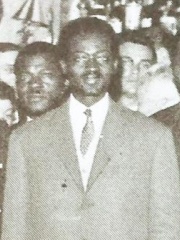
10. Abel Goumba (1926 - 2009)
With an HPI of 55.54, Abel Goumba is the 10th most famous Central African Politician. His biography has been translated into 19 different languages.
Abel Nguéndé Goumba (French pronunciation: [abɛl gumba]; 18 September 1926 – 11 May 2009) was a Central African politician. During the late 1950s, he headed the government in the period prior to independence from France, and following independence he was an unsuccessful candidate for President of the Central African Republic four times (1981, 1993, 1999, and 2005). Goumba, who was President of the Patriotic Front for Progress (FPP) political party, served under President François Bozizé as Prime Minister from March 2003 to December 2003 and then as Vice President of the Central African Republic from December 2003 to March 2005. Subsequently, he was appointed to the official post of Ombudsman.
People
Pantheon has 17 people classified as Central African politicians born between 1910 and 1973. Of these 17, 10 (58.82%) of them are still alive today. The most famous living Central African politicians include Faustin-Archange Touadéra, Michel Djotodia, and Félix Moloua. The most famous deceased Central African politicians include Jean-Bédel Bokassa, David Dacko, and Barthélemy Boganda. As of April 2024, 1 new Central African politicians have been added to Pantheon including Jean-Bédel Bokassa Jr..
Living Central African Politicians
Go to all RankingsFaustin-Archange Touadéra
1957 - Present
HPI: 66.54
Michel Djotodia
1949 - Present
HPI: 64.92
Félix Moloua
HPI: 56.54
Nicolas Tiangaye
1956 - Present
HPI: 53.29
Élie Doté
1948 - Present
HPI: 52.11
André Nzapayeké
1951 - Present
HPI: 51.69
Jean-Bédel Bokassa Jr.
1973 - Present
HPI: 49.51
Mahamat Kamoun
1961 - Present
HPI: 49.16
Henri-Marie Dondra
1966 - Present
HPI: 48.15
Firmin Ngrébada
1968 - Present
HPI: 45.99
Deceased Central African Politicians
Go to all RankingsJean-Bédel Bokassa
1921 - 1996
HPI: 79.40
David Dacko
1930 - 2003
HPI: 67.73
Barthélemy Boganda
1910 - 1959
HPI: 65.03
Ange-Félix Patassé
1937 - 2011
HPI: 64.48
André Kolingba
1936 - 2010
HPI: 63.15
Elisabeth Domitien
1925 - 2005
HPI: 60.09
Abel Goumba
1926 - 2009
HPI: 55.54
Newly Added Central African Politicians (2025)
Go to all RankingsOverlapping Lives
Which Politicians were alive at the same time? This visualization shows the lifespans of the 7 most globally memorable Politicians since 1700.

